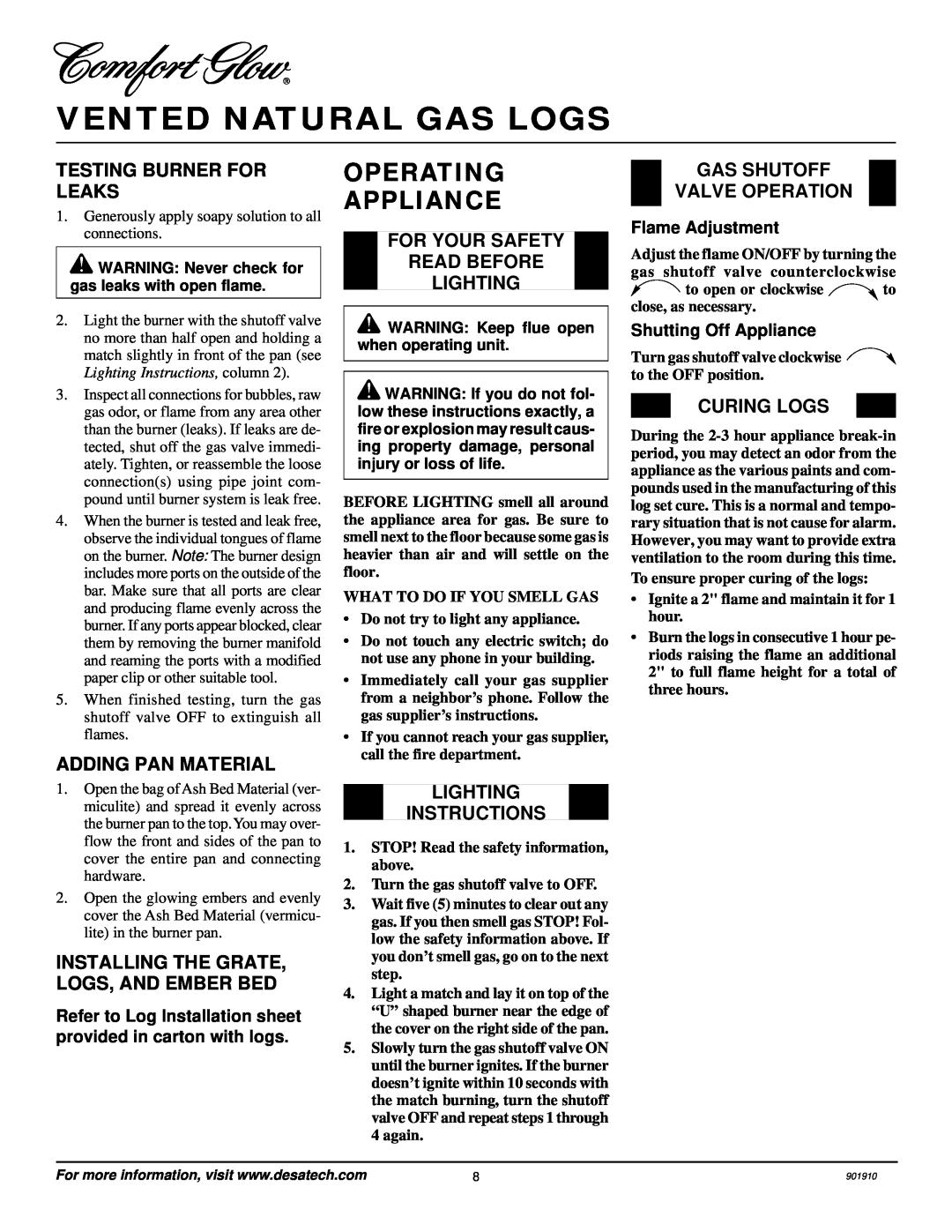
VENTED NATURAL GAS LOGS
TESTING BURNER FOR LEAKS
1.Generously apply soapy solution to all connections.
![]() WARNING: Never check for gas leaks with open flame.
WARNING: Never check for gas leaks with open flame.
2.Light the burner with the shutoff valve no more than half open and holding a match slightly in front of the pan (see Lighting Instructions, column 2).
3.Inspect all connections for bubbles, raw gas odor, or flame from any area other than the burner (leaks). If leaks are de- tected, shut off the gas valve immedi- ately. Tighten, or reassemble the loose connection(s) using pipe joint com- pound until burner system is leak free.
4.When the burner is tested and leak free, observe the individual tongues of flame on the burner. Note: The burner design includes more ports on the outside of the bar. Make sure that all ports are clear and producing flame evenly across the burner. If any ports appear blocked, clear them by removing the burner manifold and reaming the ports with a modified paper clip or other suitable tool.
5.When finished testing, turn the gas shutoff valve OFF to extinguish all flames.
ADDING PAN MATERIAL
1.Open the bag of Ash Bed Material (ver- miculite) and spread it evenly across the burner pan to the top.You may over- flow the front and sides of the pan to cover the entire pan and connecting hardware.
2.Open the glowing embers and evenly cover the Ash Bed Material (vermicu- lite) in the burner pan.
INSTALLING THE GRATE, LOGS, AND EMBER BED
Refer to Log Installation sheet provided in carton with logs.
OPERATING
APPLIANCE
FOR YOUR SAFETY
READ BEFORE
LIGHTING
![]() WARNING: Keep flue open when operating unit.
WARNING: Keep flue open when operating unit.
![]() WARNING: If you do not fol- low these instructions exactly, a fire or explosion may result caus- ing property damage, personal injury or loss of life.
WARNING: If you do not fol- low these instructions exactly, a fire or explosion may result caus- ing property damage, personal injury or loss of life.
BEFORE LIGHTING smell all around the appliance area for gas. Be sure to smell next to the floor because some gas is heavier than air and will settle on the floor.
WHAT TO DO IF YOU SMELL GAS
•Do not try to light any appliance.
•Do not touch any electric switch; do not use any phone in your building.
•Immediately call your gas supplier from a neighbor’s phone. Follow the gas supplier’s instructions.
•If you cannot reach your gas supplier, call the fire department.
LIGHTING
INSTRUCTIONS
1.STOP! Read the safety information, above.
2.Turn the gas shutoff valve to OFF.
3.Wait five (5) minutes to clear out any gas. If you then smell gas STOP! Fol- low the safety information above. If you don’t smell gas, go on to the next step.
4.Light a match and lay it on top of the “U” shaped burner near the edge of the cover on the right side of the pan.
5.Slowly turn the gas shutoff valve ON until the burner ignites. If the burner doesn’t ignite within 10 seconds with the match burning, turn the shutoff valve OFF and repeat steps 1 through 4 again.
GAS SHUTOFF
VALVE OPERATION
Flame Adjustment
Adjust the flame ON/OFF by turning the gas shutoff valve counterclockwise ![]() to open or clockwise
to open or clockwise ![]() to close, as necessary.
to close, as necessary.
Shutting Off Appliance
Turn gas shutoff valve clockwise ![]() to the OFF position.
to the OFF position.
CURING LOGS
During the
•Ignite a 2" flame and maintain it for 1 hour.
•Burn the logs in consecutive 1 hour pe- riods raising the flame an additional 2" to full flame height for a total of three hours.
For more information, visit www.desatech.com | 8 | 901910 |
